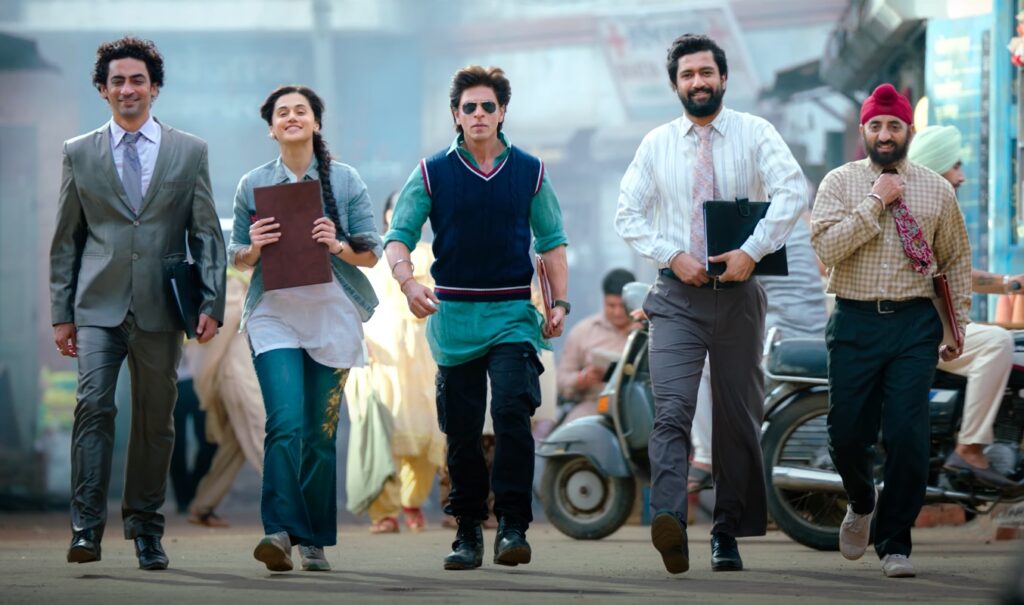Hindi Movie Review: Dunki succeeds as a broad character comedy, but fails as a nuanced commentary on immigration

What a 2023 it has been for Shah Rukh Khan, whose return to leading roles following a four-year hiatus couldn’t have gone any better from a commercial perspective. Audiences warmly embraced his action extravaganzas Jawan and Pathaan, catapulting them to the first and second slots, respectively, for the calendar year at the Indian box office. Both garnered high marks from critics (including yours truly), as well, with robust compliments given to Khan’s performances and the overall craftsmanship of the films.
Now comes Dunki, Khan’s third and final movie of the year, and the first comedy-drama of the bunch. It’s a heartwarming, crowd-pleasing journey that’s likely to be just as much of a hit with audiences as Jawan and Pathaan, especially families looking for a feel-good outing over the Christmas holiday period. Critics, however, are likely to meet this one with more reserved praise, as its social commentary on immigration comes across as awfully simpleminded when held up to any level of scrutiny.
But let’s start with the positives, of which there are many. First and foremost, Dunki is a friendship movie/road comedy with a cast that has effortless chemistry together. After a brief prologue set in the present, we meet friends Hardy (Khan), Manu (Taapsee Pannu), Buggu (Vikram Kochhar), and Balli (Anil Grover) in the year 1995. All of the actors play both much-younger versions of themselves in 1995 and much-older versions of themselves in 2023, with relatively modest makeup and hairstyling enhancements, which is a ludicrous creative choice on its face but it somehow only adds to the film’s spunky charm.
In the mid-’90s, all four members of the central quartet find themselves stuck in various ruts in the fictional Punjab village of Laltu. Hardy has just gotten out of the Army, where he was saved by Manu’s brother, who didn’t make it out alive himself; Manu’s family is struggling financially, forcing them to move into the annex next to their former home; Buggu simply wants to be able to afford a proper sari for his mother, who must suffer the humiliation of working in pants; and Bali wants to save his own mom from slaving away at the family tailoring business.
All four aspire to collectively immigrate to London as the answer to their current financial woes. Well, with the exception of Hardy, who seems to be driven largely by Manu, for whom he has developed a massive crush. But without college degrees, robust savings, or high-value skills, they are S.O.L. when it comes to securing visas. That doesn’t stop them from trying, however, which lends itself to some genuinely funny hijinks, including English classes that often had me in stiches. When Hardy devises a seemingly foolproof strategy for passing the verbal examination without actually learning the language, the outcome is absolutely hysterical.
The energetic humor of this section is largely maintained when the group decides they have no option but to illegally immigrate to England (or “London,” as they call it), even though the sobering event that finally pushes them to make the trek is decidedly not-at-all-funny. The film also doesn’t stray away from showing the brutal, dehumanizing aspects of a migrant’s journey. But this is one of the movie’s greatest virtues: it finds the right balance between an authentic depiction of what it means to be a dunker taking a dunki (the colloquial Hindi term for an illegal trip to another country) and zany road comedy along the way. The humorous interludes over the course of the continent-spanning journey don’t undermine the sobering moments in which the quartet (and the larger group of dunkers they travel with) endure unimaginable conditions. These include being shot at by patrollers in neighboring Middle Eastern countries and being tightly packed into a shipping container for weeks.
Based on the early glimpse of the group in the present, we know that they successfully make it to London, so it’s never overly stressful to endure their often life-threatening journey. Despite taking away the suspense-factor in favor of keeping the tone lighter overall, the film does still have some modest surprises (including an action climax) in store for the third act, which returns to current-day. Many of these really try to prod at the heartstrings, which might seem nauseatingly saccharine in a movie with less lovable characters, but the tactic mostly works here. Some viewers may find the conclusion of Dunki to be a little “too easy” in this regard, but I ultimately fell for it, even though it isn’t even trying to hide how emotionally manipulative it is.
All four actors are entirely charming in their ensemble roles. As the younger version of Hardy, Khan sports an absolutely ridiculous period hairdo and wardrobe, but he’s so charismatic and likable that you can’t help but see him as one suave motherfucker. As the older version, he’s not quite as infectious, but the (slightly) toned-down approach helps sell the pathos of the ending. As Manu, Taapsee Pannu makes for both a good love interest for Khan and a compelling individual character, with an endearing spirit. Vikram Kochhar gets some of the film’s biggest laughs as the over-the-top but lovable Buggu, while Anil Grover puts perhaps the most human face on the immigrant experience of the entire cast in portraying Balli.
That said, for as much as Dunki succeeds as a character-focused dramedy and even as a firsthand look at global migration, its sociopolitical commentary on illegal immigration is painfully anemic. Part of this is because the filmmakers feel a need to depict India in a positive light, so they really underplay the desperation that would cause a person to migrate without visa authorization. But the movie also advocates for an “open borders” worldview in a hopelessly naïve manner, making an awfully juvenile case that there were no enforced borders on Earth until roughly 200 years ago and that perhaps the world should return to such a utopia. Never is the film’s lack of sophistication in this arena more transparent than during a contrived immigration hearing sequence, in which Hardy refuses to declare asylum out of respect for his homeland before a British judge whose hands are tied. Especially at a time when immigration has returned to hot-button status in the U.S. and much of Europe, Dunki seems woefully ill-equipped to make the case for open borders.
The movie is also just way too long for the mostly lighthearted affair that it works best as, clocking in at two hours and 41 minutes. Co-writer/director Rajkumar Hirani, the mind behind the Hindi comedy megahits 3 Idiots and PK, serves as his own editor here (as he typically does on his films), but he ultimately may have been better served by an outsider working alongside him in the cutting bay. While the decades-spanning, country-hopping narrative of Dunki certainly provides enough material for a near-three-hour-long movie, it grows a little tiresome in the latter stages of the journey. Because we know from the outset that the quartet make it to London, we wish they would hurry up and get there already by a certain point in the runtime.
That said, as a good-hearted, family-friendly holiday movie outing, Dunki pulls many of the right (heart)strings. I suspect that most viewers will fall in love with these characters, and that alone will be enough to keep them invested in the film, flaws aside. Shah Rukh Khan may not necessarily have his third unabashed critical hit of the year, but he sure knows how to please an audience.

